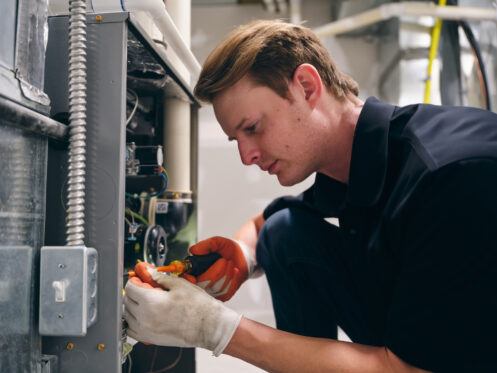Whether you have an existing furnace or you’re thinking of upgrading to a new one, understanding the typical lifespan of a furnace is a necessity. The truth is that while the furnace manufacturer can give you an estimated unit lifespan, it’s not always accurate. Numerous factors can influence the overall lifespan of the furnace that you purchase.
An Estimated Lifespan
Before we get into the factors that can influence the overall lifespan of your heating unit, let’s start by discussing the typical furnace manufacturer’s estimated lifespan. Most manufacturers will give an estimated lifespan of between 15 to 20 years from the date of purchase. This is a simple estimate that you can base your future budgeting on. However, there are more specific factors that can influence how long your furnace lasts.
Maintenance Received
One of the biggest factors that is going to influence the total lifespan of your furnace is how often it receives maintenance. This includes maintenance by you as the homeowner, such as replacing dirty air filters and professional maintenance performed yearly. Furnaces that undergo regular maintenance tend to last longer than furnaces that don’t receive adequate maintenance. This is simply because furnaces that don’t get quality maintenance will have parts that overwork and prematurely wear out.
Product Quality Level
When you first start looking at furnaces, it becomes clear that there are different quality levels. This is depicted by the initial purchase price and the warranty coverage. A quality furnace will come standard with a manufacturer’s 10-year parts warranty and 20-year heat exchanger warranty. If you purchase a furnace with a shorter warranty, likely, it won’t last as long.
Furnace Location
Where your furnace gets installed in your home can play a big role in how long it lasts. Ideally, your furnace should be installed in your full basement. This protects it from unwanted pest infestation and extreme temperature changes. A furnace installed in an attic is more susceptible to stress when the attic gets extremely warm in the summertime.
Additionally, furnaces installed in crawlspaces are more susceptible to pest infestation and outdoor elements. If your furnace is installed in one of these less-than-ideal locations, it’s likely going to have a shorter lifespan than one installed in a full basement.
Furnace Size
It’s important to note that the longevity of your furnace is going to be highly affected by its sizing compared to its environment. You should always have your new furnace installed by a licensed HVAC professional who can ensure that it’s the right size for your heating needs.
If you install a furnace that’s too small for your home, it will constantly run. This will cause premature wear and tear on the system, which will decrease its overall lifespan. If you have a furnace installed that is too big for your home, it can cause problems as well. Not only will your home not be comfortable, and your energy bills will be through the roof, but your system will run inefficiently. This will lead to a shorter overall lifespan for your oversized unit.
Home Insulation
The amount of insulation that you have in your home can also affect the lifespan of your heating system. Insulation is a necessary barrier that will allow warm air to stay trapped inside your home during those cold winter days. If you have a lot of insulation, your furnace won’t have to run as often to keep your home warm and comfortable.
However, if your home lacks proper insulation, cold air drafts will make their way in. This will lower the ambient temperature inside your home, which means your furnace will have to run harder to keep your home warm. The more your furnace has to run, the shorter its overall lifespan will be.
Ductwork
The state of your ductwork is also going to play a large role in the overall lifespan of your new furnace. If your ducting is clogged and full of debris, your furnace will need to work harder to push warm air through your ducting. Also, if your ducting has leaks and joints that are pulling apart, you’re going to lose some of the hot air that your furnace produces in your wall cavities. This will result in your furnace having to run longer to deliver adequate warm air to the rooms throughout your home.
Call the Professionals Today
We offers top-quality furnace installation services for Downers Grove and the surrounding areas. We can also help with all of your heating, cooling, ductless mini-split, heat pump, indoor air quality and commercial needs. Contact Fire 'n' Ice Heating & Cooling, Inc. today, and we’ll send a technician to your home.


